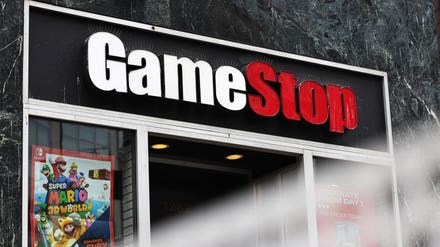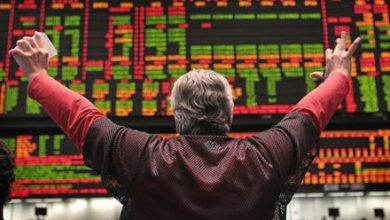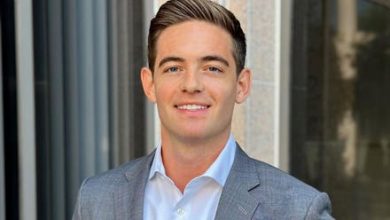The SEC Was Investigating GameStop In 2021

NEW YORK, NEW YORK – JANUARY 27: GameStop storefront from 2021 in New York City. (Photo by Michael M. Santiago/Getty Images)
Getty Images
It’s been three years since GameStop madness roiled markets. There’s been Congressional testimony over its extreme volatility, an SEC report on trading activity in GameStop’s options and stock, and endless chatter on X and Reddit about the video game company. Until now, there’s been no confirmation whether the regulator was actually investigating GameStop for potential securities law violations.
Suspicions are now confirmed thanks to GameStop’s new Head of Social Media, Joe Fonicello, who says he was subpoenaed by the SEC for an investigation “In the Matter of GameStop” that lasted from at least May 2021 through January 2022. Fonicello, who used to run a website called gmedd.com, had been a vocal gadfly during the GameStop meme craze. GameStop hired him to be its social media czar last month. The contents of the subpoena, which were detailed by Fonicello to Forbes in the weeks before his hiring by GameStop, included a list of other persons and companies the SEC considered relevant to an investigation. A partner at one of those entities named, Adam Merlo of Myst Advisors, also recently confirmed to Forbes that it was contacted for the investigation, as did Brian P. McGough, founding partner of Hedgeye. GameStop did not respond to requests to comment.
Fonicello says he had been in contact with the SEC about the subpoena until January 2022. In response to requests for documents related to GameStop and to Cohen’s RC Ventures, the SEC said in January 2024 that it would not release them because of an enforcement proceedings that are “still active and ongoing,” although it did not specify that those companies were the subjects.
It is not clear when the investigation Myst and Fonicello were contacted for concluded, and the SEC would only say that it “does not comment on the existence or nonexistence of a possible investigation.” Merlo, who was not working at Myst until July 2021, believes any possible charges have been dropped and says that Myst Advisors was not accused of any wrongdoing. Hedgeye’s McGough says he isn’t personally aware of any outreach from the SEC for at least a year.
The subpoena sought information about Fonicello’s relationships with 18 people and companies, including GameStop CEO Ryan Cohen. Specifically, the SEC inquired about documents and communications between Fonicello and the following: Senvest Management, LLC, David Levy, former Senior Research Analyst at Senvest, DOMO Capital Management, Maven Group LLC, Hedgeye Risk Management, LLC, Myst Advisors, GameStop Corp., Ryan Cohen, CEO and chairman of GameStop, Keith Gill, “meme stock” influencer known as Roaring Kitty on YouTube, Dave Portnoy, founder of Barstool Sports, Harris Kupperman, founder and president of Praetorian Capital, Alvan Chow, Redditor also known as “JeffAmazon”, Scott Preston, founder of Maven Group LLC, Justin Dopierala, President and Founder of DOMO Capital, Brian McGough, Co-founder of Hedgeye, Melvin Capital Management LP, Citadel Advisors LLC , Maplelane Capital, LLC.
The SEC also requested communications with other traders of GameStop securities, communications concerning the respective funds and investments of Melvin Capital, Citadel Advisors LLC, or Maplelane Capital, and all social media posts and messages concerning GameStop.
The investigation, “In the Matter of GameStop,” implies that it was separate from an SEC investigation into Cohen’s profits after trading Bed Bath and Beyond stock reported by The Wall Street Journal last year, the status of which is unknown and which GameStop has not commented on. Bed Bath and Beyond, which filed for bankruptcy in April 2023, sued Cohen last week for $47 million, accusing him of insider trading. Cohen has not responded.Given the time that has passed since Fonicello’s subpoena, Silver Law Group Managing Partner Scott Silver says it is “likely” that the other people named in Fonicello’s subpoena would have also been subpoenaed by the SEC. If they were not, Silver explains, the SEC runs the risk of these potential sources learning of the investigation and deleting sensitive files before being contacted. That said, Silver cautions that “the SEC tends to paint with a very broad brush at the early stages of an investigation.”
Most of these individuals did not respond to requests for comment. Justin Dopierala of DOMO Capital and David Portnoy denied familiarity with the investigation. Citadel, Senvest, and Scott Preston denied our request to comment.
Fonicello says that questions he was asked by the SEC implied the commission was looking for potential signs of market manipulation, including questions about social strategy and sharing investment advice.
According to Fonicello, a disclosure included in the subpoena says the investigation is a “non-public, fact finding inquiry” and that the commission was “trying to determine whether there have been any violations of the federal securities laws,” according to Fonicello. The disclosure also states, according to Fonicello, that the SEC does not necessarily have a “negative opinion” of any of these entities.
“There’s no way to know the scope” without confirmation directly from the SEC, says Silver, as the commission would likely not reveal all of their research to an individual subpoenaed. The target of an SEC investigation typically only becomes public, Silver says, if the SEC issues a Wells Notice or indictment — and the SEC often conducts investigations without ever reaching a clear resolution. No Wells Notice was issued in this case.
GameStop’s post-pandemic trading.
YCharts
The media has taken to calling GameStop a “meme stock” because of its internet-driven virality, irrational trading and the juvenile humor associated with the communities who invested in the stocks.. In 2020 GameStop was heavily shorted by mostly Wall Street hedge funds, in part because its mall-based approach had been made obsolete by the ubiquity of video-gaming online. Redditor and YouTuber Roaring Kitty made the case that GameStop was a legacy brand primed for digitization and, thus, a great investment. Ryan Cohen, independently a billionaire from founding and selling online pet supplies retailer Chewy plowed $76 million into the company — a 12.9% stake — and embarked on an activist investor campaign that made him Chairman of the Board and, by September 2023, CEO.



